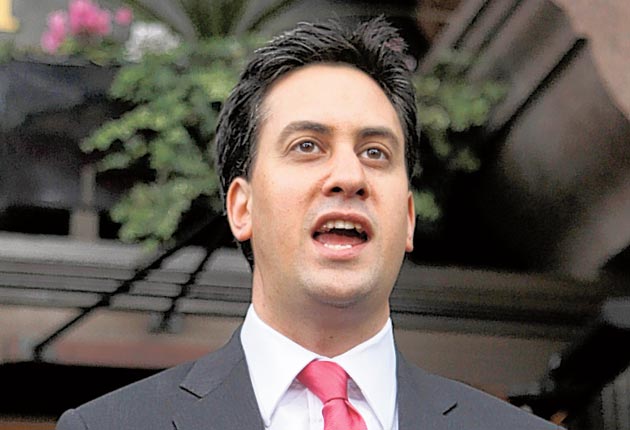Miliband vows to move beyond New Labour

Your support helps us to tell the story
This election is still a dead heat, according to most polls. In a fight with such wafer-thin margins, we need reporters on the ground talking to the people Trump and Harris are courting. Your support allows us to keep sending journalists to the story.
The Independent is trusted by 27 million Americans from across the entire political spectrum every month. Unlike many other quality news outlets, we choose not to lock you out of our reporting and analysis with paywalls. But quality journalism must still be paid for.
Help us keep bring these critical stories to light. Your support makes all the difference.
Ed Miliband will try to silence his critics today by spelling out his strategy for Labour to reconnect with the voters with whom it lost touch during 13 years in power.
In an important speech, the Labour leader will tell his party that it cannot offer "more of the same" and must move "beyond New Labour" as it learns the lessons from its election defeat in May.
But internal Labour sniping at his performance grew yesterday after he struggled to define his flagship plan to appeal to Britain's "squeezed middle" in a BBC Radio 4 interview. He appeared to suggest that the group covered 90 per cent of the population.
Pressed repeatedly by John Humphrys on the Today programme, an uncomfortable Mr Miliband said he was talking about people with incomes "above and below" £26,000 a year but declined to be more specific.
He also raised eyebrows by saying he almost joined Wednesday's student protest over university tuition fees. "I was quite tempted to go out and talk to them," he said. "I applaud young people who peacefully demonstrate." Asked why he did not join the marchers, he replied: "I think I was doing something else at the time."
The Tories accused him of "dithering" and even some Labour MPs were privately alarmed at his attempt to sit on the fence.
Today, Mr Miliband will describe the "squeezed middle" as families on low and middle incomes with whom Labour lost touch, who are being offered little by the Coalition Government and are most exposed to its squeeze on living standards and spending cuts.
He will tell Labour's national policy forum in Gillingham: "The hard truth is that New Labour, which set out to help people have a better life, lost its way.
"It is our job now to learn the lessons of that defeat so we go into the next election with a new solutions for the future that provide better answers to the questions people ask of us – how will we help them find security? How will we help them achieve their hopes and dreams?
"We need better answers to those questions. Because more of the same will not close the gap between what people want out of life and what they can achieve at the moment. That is why we need to move beyond New Labour."
Mr Miliband will announce details of Labour's root-and-branch policy review. He will insist that it will be an outward-looking process in which local parties and trade unions will hold "one million conversations" with members of the public. Working groups will be chaired by Shadow Cabinet members but will include outside experts such as businessmen and academics. Think tanks and charities will be invited to submit ideas.
A Labour spokesman said: "We want this process to be rooted in real people's lives. We want it to lead to real change in our movement. Ed is determined that Labour mustn't retreat into a discussion with itself. He wants Labour to reach out in a way it was never able to do while in government, and draw on the best ideas from across the political landscape."
Separate task forces give some clues to Mr Miliband's agenda. One will cover fair pay, including greater transparency over high and equal pay and the idea of a living wage higher than the national minimum wage. A group on personal debt will consider the case for tighter rules on lending. Other issues to be addressed include volunteering, the victims of crime, isolation and loneliness, low pay and small businesses.
The policy reviews will cover the economy, public service reform, families and carers, political reform and defence and security.
Subscribe to Independent Premium to bookmark this article
Want to bookmark your favourite articles and stories to read or reference later? Start your Independent Premium subscription today.
Join our commenting forum
Join thought-provoking conversations, follow other Independent readers and see their replies
Comments